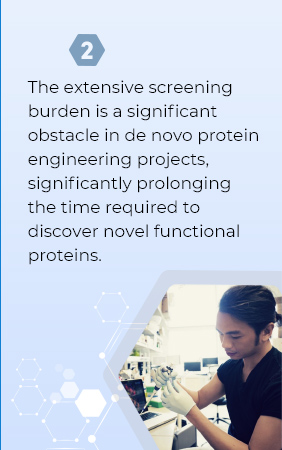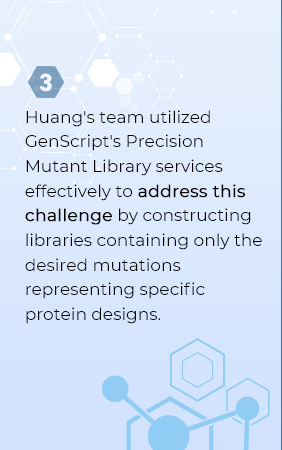-
REAGENT SERVICES
Hot!
-
Most Popular Services
-
Molecular Biology
-
Recombinant Antibody/Protein
-
Reagent Antibody
-
CRISPR Gene Editing
-
DNA Mutant Library
-
IVT RNA and LNP Formulations
-
Oligo Synthesis
-
Peptides
-
Cell Engineering
-
- Gene Synthesis FLASH Gene
- GenBrick™ Up to 200kb
- Gene Fragments Up to 3kb now
- Plasmid DNA Preparation Upgraded
- Cloning and Subcloning
- ORF cDNA Clones
- mRNA Plasmid Solutions New!
- Cell free mRNA Template New!
- AAV Plasmid Solutions New!
- Mutagenesis
- GenCircle™ Double-Stranded DNA New!
- GenSmart™ Online Tools
-
-
PRODUCTS
-
Most Popular Reagents
-
 Instruments
Instruments
-
Antibodies
-
ELISA Kits
-
Protein Electrophoresis and Blotting
-
Protein and Antibody Purification
-
Recombinant Proteins
-
Molecular Biology
-
Stable Cell Lines
-
Cell Isolation and Activation
-
 IVD Raw Materials
IVD Raw Materials
-
 Therapy Applications
Therapy Applications
-
Resources
-
- All Instruments
- Automated Protein and Antibody Purification SystemNew!
- Automated Plasmid MaxiprepHot!
- Automated Plasmid/Protein/Antibody Mini-scale Purification
- eBlot™ Protein Transfer System
- eStain™ Protein Staining System
- eZwest™ Lite Automated Western Blotting Device
- CytoSinct™ 1000 Cell Isolation Instrument
-
- Pharmacokinetics and Immunogenicity ELISA Kits
- Viral Titration QC ELISA Kits
- -- Lentivirus Titer p24 ELISA KitHot!
- -- MuLV Titer p30 ELISA KitNew!
- -- AAV2 and AAVX Titer Capsid ELISA Kits
- Residual Detection ELISA Kits
- -- T7 RNA Polymerase ELISA KitNew!
- -- BSA ELISA Kit, 2G
- -- Cas9 ELISA KitHot!
- -- Protein A ELISA KitHot!
- -- His tagged protein detection & purification
- dsRNA ELISA Kit
- Endonuclease ELISA Kit
- COVID-19 Detection cPass™ Technology Kits
-
- Automated Maxi-Plasmid PurificationHot!
- Automated Mini-Plasmid PurificationNew!
- PCR Reagents
- S.marcescens Nuclease Benz-Neburase™
- DNA Assembly GenBuilder™
- Cas9 / Cas12a / Cas13a Nucleases
- Base and Prime Editing Nucleases
- GMP Cas9 Nucleases
- CRISPR sgRNA Synthesis
- HDR Knock-in Template
- CRISPR Gene Editing Kits and Antibodies
-
![AmMag™ Quatro Automated Plasmid Purification]() AmMag™ Quatro automated plasmid purification
AmMag™ Quatro automated plasmid purification
-
![Anti-Camelid VHH]() MonoRab™ Anti-VHH Antibodies
MonoRab™ Anti-VHH Antibodies
-
![ELISA Kits]() ELISA Kits
ELISA Kits
-
![Precast Gels]() SurePAGE™ Precast Gels
SurePAGE™ Precast Gels
-
![Quatro ProAb Automated Protein and Antibody Purification System]() AmMag™ Quatro ProAb Automated Protein and Antibody Purification System
AmMag™ Quatro ProAb Automated Protein and Antibody Purification System
-
![Target Proteins]() Target Proteins
Target Proteins
-
![AmMag™ Quatro Automated Plasmid Purification]() AmMag™ Quatro automated plasmid purification
AmMag™ Quatro automated plasmid purification
-
![Stable Cell Lines]() Stable Cell Lines
Stable Cell Lines
-
![Cell Isolation and Activation]() Cell Isolation and Activation
Cell Isolation and Activation
-
 IVD Raw Materials
IVD Raw Materials
-
![Quick
Order]() Quick Order
Quick Order
-
![Quick
Order]() Quick Order
Quick Order
- APPLICATIONS
- RESOURCES
- ABOUT US
- SIGN IN My Account SIGN OUT
- REGISTER

![Hear from the Huang lab at Stanford University Hear from the Huang lab at Stanford University]()
Hear from the Huang lab at Stanford University
Precise Mutant Libraries Ease and Expedite the Path to Novel Proteins
What We Do » How to Partner With Us » Accelerate Novel Protein Discovery with GenScript's Precision Mutant Libraries | GenScript
Dr. Possu Huang's laboratory at Stanford University is focused on designing and testing novel protein structures using computational modeling, structural biology, and experimental library optimization.
“ ”We build computational models of proteins based on design hypotheses. The fact that you can cover exactly the distribution, positions, and mutation sites to test our hypotheses, not only streamlines the experiments but also informs our understanding better than using degenerate codons.
- Possu Huang, Stanford University

Project’s Critical Challenge
Huang's team has developed various platforms for protein engineering, which can address obstacles in biomedical, industrial, and synthetic biology applications. The team has undertaken various protein bioengineering projects, including developing the TRACeR platform to design novel proteins with improved recognition of peptides presented in the context of MHC complexes.
Huang’s group was inspired by superantigens to develop novel TCR-like proteins that can specifically recognize MHC-bound peptides. These molecules can be used in various cancer immunotherapy strategies and potentially enhance CAR-T cells’ specificity.
Computational protein design pipelines enabled them to model interactions and identify suitable protein conformations for docking and binding to peptide-MHC complexes. The team then undertook high-throughput screening approaches, leveraging a yeast display library and peptide-loaded MHC tetramers to test their various protein designs.
However, evaluating many mutations resulting from random changes can significantly slow their progress in the screening stage. Therefore, Huang's team relied on GenScript's Precision Mutant Library services to address this challenge and build a library containing only the desired mutations representing select protein designs.
GenScript Partnership Benefit
To reduce the screening burden and expedite the time to novel functional proteins, Huang’s team leveraged GenScript’s DNA synthesis platforms to generate predicted designs. Precision mutant libraries are high-quality and diverse synthetic libraries that contain only desired mutants. Precision is enabled by GenScript’s Next-Generation Semiconductor-based DNA Synthesis in combination with an automated platform, allowing the incorporation of individually specified nucleotides.
Related Services

-











































